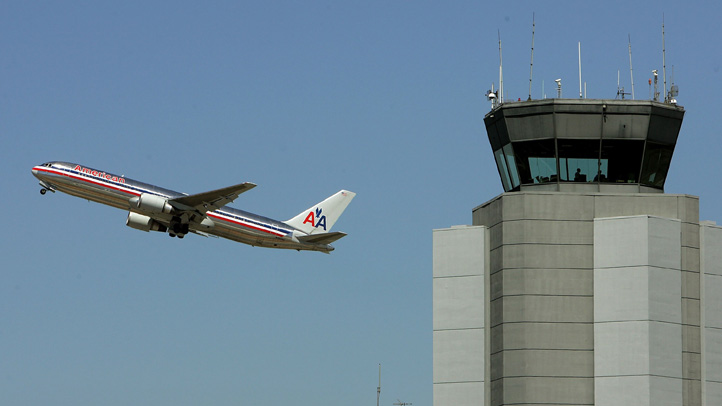American Airlines and its parent company are filing for Chapter 11 bankruptcy protection as they seek to cut costs and unload massive debt built up by years of high jet fuel prices and labor struggles.
The nation's third-largest airline also said Tuesday that CEO Gerard Arpey stepped down and was replaced by company president Thomas W. Horton.
"It is a privilege and an honor to lead this company and I intend to do everything in my power to help restore its position of leadership in the global airline industry," Horton said in a press release.
AMR Corp. has continued to lose money while other U.S. airlines returned to profitability in the last two years.
Horton said the board of directors unanimously decided to file for bankruptcy after meeting Monday in New York and again by conference call on Monday night.
American said it would operate normally while it reorganizes in bankruptcy. The airline said it would continue to operate flights, honor tickets and take reservations. It said the AAdvantage frequent-flier program would not be affected. See more from AA on their Chapter 11 reorganization here.
Horton said, however, that as the company goes through a restructuring it will probably reduce the flight schedule "modestly," with corresponding cuts in jobs.
The company will delay the spin-off of its regional airline operation, American Eagle, which was expected in early 2012. AMR Eagle Holding Corp. also filed for bankruptcy.
American was the only major U.S. airline that didn't file for bankruptcy protection in the aftermath of the 2001 terrorist attacks that triggered a deep slump in the airline industry. The last major airline to file for bankruptcy protection was Delta in 2005.
Speculation about an AMR bankruptcy grew in recent weeks, however, as negotiations with pilots and other workers over cost-saving labor contracts seemed to stall. The company said that labor-contract rules forced it to spend at least $600 million more per year than other airlines.
Horton said, however, that there was no single factor that led to the bankruptcy filing. He said the company needed to cut costs in view of the weak global economy and high, volatile fuel prices. The average price of jet fuel has risen more than 50 percent in the past five years.
Ray Neidl, an analyst with Maxim Group LLC, said AMR was wise to file for bankruptcy while it still had about $4 billion in cash. He said the company has strong assets but needs to find labor peace and more revenue. He believes American might be pushed into a merger with US Airways.
The president of the Allied Pilots Association, Dave Bates, said his members were concerned about what the bankruptcy will mean for them -- other airlines used bankruptcy to terminate pension plans.
Local
The latest news from around North Texas.
"While today's news was not entirely unexpected, it is nevertheless disappointing that we find ourselves working for an airline that has lost its way," Bates said in a message to pilots.
The APA had been going back and forth with company over contracts for years. Sticking points were pay and scope. Scope meaning, the pilots wanted job protection in case of a merger.
Now, pilots realize the next offer, under auspices of bankruptcy might be worse.
"We're undoubtedly facing significant pay cuts, reduction in benefits changes to workload and retirement," said Tom Hoban, pilot and spokesperson for the airline.
Flight attendants also say it's a sad day for the airline. They're hoping to be proactive and work with the company to emerge stronger.
Laura Glading, president of that union described the concerns of the group,
"Do I expect the company will try to reduce benefits and possibly reduce benefits and possibly reduce our pay? I think so, it’s not necessary, and we will do what we can to keep things as seamless as possible."
The Transportation Workers Union which represents fleet service techs, mechanics among other groups did not comment on the situation.
Darryl Jenkins, a consultant who has worked for the major airlines, said AMR will be able to cut costs in bankruptcy and that employees and shareholders would be the big losers.
"Labor is going to take a major hit," Jenkins said. "Their pensions are in danger."
Shareholders will be wiped out -- AMR shares had already tumbled 79 percent this year on bankruptcy fears. The shares closed Monday at $1.62 and at $.26 Tuesday. AMR lost $162 million in the third quarter and has posted losses in 14 of the last 16 quarters.
AMR has about $4 billion in cash and has announced plans to order 460 new narrow-body planes used primarily in the U.S., plus other jets for longer flights.
American was the world's biggest airline as recently as 2008, but has fallen behind United and Delta after those two companies bought other airlines.
American was founded in 1930 from the combination of more than 80 smaller carriers. It now flies about 240,000 passengers per day and has about 78,000 employees.
The airline operates out of five major hubs in New York, Los Angeles, Dallas/Fort Worth, Chicago, and Miami. It has major international partnerships with British Airways and Japan Airlines.
NBC 5's Ray Villeda contributed to this report.
 Find complete coverage of the American Airlines Bankruptcy proceedings, expert analysis, and impact to customers and the local economy in our Special Section. Click here for more. |



